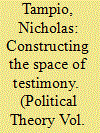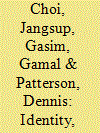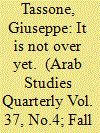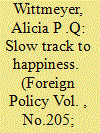|
|
|
Sort Order |
|
|
|
Items / Page
|
|
|
|
|
|
|
| Srl | Item |
| 1 |
ID:
108019


|
|
|
|
|
| Publication |
2011.
|
| Summary/Abstract |
How do we conceptualize distinctions between religious-political territories in the contemporary world when old categories-such as Islam and the West, or dar al-Islam and dar al-harb-precipitate misunderstandings and conflicts? In this essay, I consider Tariq Ramadan's argument that Muslims must enact an intellectual transformation along the lines of Kant's Copernican revolution and thence create concepts-such as the space of testimony (dar al-shahada)-to facilitate interreligious dialogue, cooperation, and respectful contestation. The essay aims to illuminate the nature of Ramadan's political theory and dispel the claim that he is a Muslim Martin Luther; to imagine the contours of a future political-intellectual movement that integrates elements of the European Enlightenment and the Arab Nahda; and to envision how Muslim and non-Muslim political theorists may combat political Manichaeanism without denying the reality and importance of contending ethical visions and political identities.
|
|
|
|
|
|
|
|
|
|
|
|
|
|
|
|
| 2 |
ID:
109078


|
|
|
|
|
| Publication |
2011.
|
| Summary/Abstract |
While work on the political behaviour of religious groups in America has shown that, among other things, religious commitment and strong opinions on salient issues can encourage turnout and raise the probability of these groups' members voting in national elections, much less is known about these relationships with respect to Muslim Americans. Using data collected at mosques in 2006 during the holy month of Ramadan, this article maps the turnout patterns of Muslim American respondents and then investigates the factors that explain the political participation of members of this increasingly important religious group. The article focuses on reported turnout in the 2004 presidential election and shows that, more than anything else, strong opinions on salient issues boosted the participation rates of members of this religious group in the election, even when controlling for other factors known to help explain turnout.
|
|
|
|
|
|
|
|
|
|
|
|
|
|
|
|
| 3 |
ID:
143129


|
|
|
|
|
| Summary/Abstract |
In their assessment of the recent revolutionary turmoil in the Middle East, Hamid Dabashi and Tariq Ramadan argue that the Arab Revolution has opened up for the Arab peoples the possibility of reconnecting themselves with their own history. In their view, there is a creative potential in the Orient itself to question, from within its own tradition, the practices and conceptual categories by which the West has objectified it, so as to produce something new and original. In this article, I contend that Dabashi's and Ramadan's appeal to the Arab cultural tradition as a source of meaning for reconstructing Arab societies is a form of culturalization of politics that blots out the role played by political economy in the Arab Revolution. To gain a theoretical grip on this question, I suggest that the ties between culture and politics be severed and, in their place, the connection between the political and the economic be restored.
|
|
|
|
|
|
|
|
|
|
|
|
|
|
|
|
| 4 |
ID:
188962


|
|
|
|
|
| Summary/Abstract |
While Ramadan in Western societies has been studied extensively in relation to health issues, no research to date has explored its representation through social scientific lenses. This article uses the Greater Western Sydney region in New South Wales, Australia, as a case study. This agglomeration of suburbs from the outer western suburbs of Sydney to the Blue Mountains has the highest proportion of Muslims in the country. To understand the representation of Islam in this region, this paper first analyses the articles in its major and local newspapers to then contrast them to the way the Ramadan festival is represented by mosques on their websites. This research discovers that Ramadan in Sydney newspapers tends to be reported in a secular fashion with a stronger focus on its public and economic activities. The focus of a large proportion of these articles on the way it attracts business demonstrates that it is a well-accepted event in Australia. In contrast, the pictures provided in Muslim sites in Sydney are more religious than the newspaper depiction and show a contrast with regard to ethnicity and gender. While the newspaper pictures are from the public sphere and tend to be multicultural across various Muslim ethnicities and do not show gender segregation, the online pictures from Muslim organisation show a strong gender segregation and represent the local ethic community they serve. While the representations in the public sphere are neo-liberal post-secularism and multiculturalism, those from these organisations are curating religiously important rather than business orientated moments in their community.
|
|
|
|
|
|
|
|
|
|
|
|
|
|
|
|
| 5 |
ID:
174256


|
|
|
|
|
| Summary/Abstract |
How are refugees responding to protect themselves and others in the midst of the Covid-19 pandemic? How do these responses relate to diverse local, national, and international structures of inequality and marginalization? Drawing on the case of Beddawi camp in North Lebanon, I argue that local responses—such as sharing information via print and social media, raising funds for and preparing iftar baskets during Ramadan, and distributing food and sanitation products to help people practice social distancing—demonstrate how camp residents have worked individually and collectively to find ways to care for Palestinian, Syrian, Iraqi, Kurdish, and Lebanese residents alike, thereby transcending a focus on nationality-based identity markers. However, state, municipal, international, and media reports pointing to Syrian refugees as having imported the virus into Beddawi camp place such local modes of solidarity and mutuality at risk. This article thus highlights the importance of considering how refugee-refugee assistance initiatives relate simultaneously to: the politics of the self and the other, politically produced precarity, and multi-scalar systems that undermine the potential for solidarity in times of overlapping
|
|
|
|
|
|
|
|
|
|
|
|
|
|
|
|
| 6 |
ID:
129229


|
|
|
|
|
| Publication |
2014.
|
| Summary/Abstract |
Anyone who has been in a Muslim country during Ramadan knows the transformation that comes about with the first sighting of the crescent moon. During the holy month, the devout fast from sunrise to sunset. Bustling thoroughfares go quiet; office hours are shorter to accommodate fasting employees; and business grinds to a halt, to the frustration of expats and foreign partners. Now, a new paper from two Harvard University researchers confirms what until now has only been a nagging suspicion: Religion isn't good for the economy. Economists Filipe Campante and David Yanagizawa-Drott examined data from every Ramadan since 1950, using the amount of time spent fasting as a measure for intensity of religious practice. Focusing on countries that were more than 75 percent Muslim, they found that when people spent more time fasting -- when Ramadan fell during the long days of summer, for instance -- it took a bigger toll on economic growth. Increasing the average daily fast in a country from 12 to 13 hours, for example, decreased GDP growth by about 0.7 percentage points, the authors found. More-intense religious ractice, in other words, left worshippers poorer. And being poorer makes you less happy, right?
|
|
|
|
|
|
|
|
|
|
|
|
|
|
|
|
|
|
|
|
|